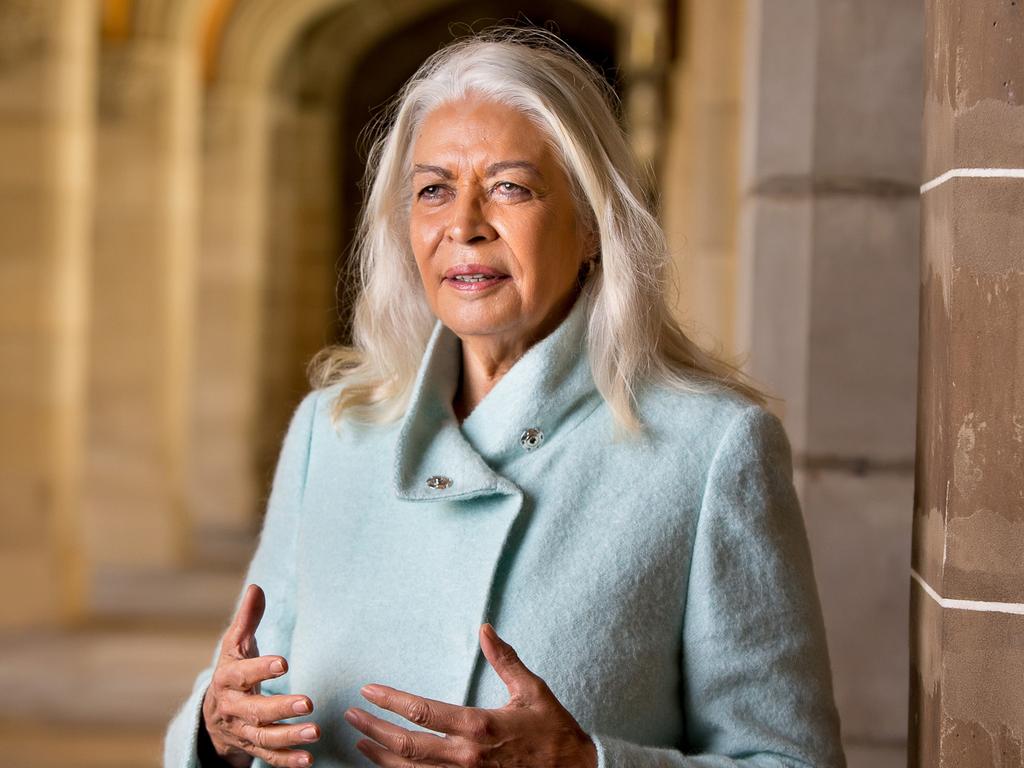‘Living knowledge systems’: Marcia Langton says Indigenous know-how is not in the past
Aboriginal leader Marcia Langton says Australia needs to make more use of the Indigenous know-how developed over millennia.

Aboriginal academic and commentator Marcia Langton says Australians should use Indigenous knowledge to address contemporary problems ranging from managing bushfires and water resources to dealing with mental health.
As co-editor of a new book covering the application of know-how developed over 65,000 years to modern Australia, she argues that far from being stuck in a time warp, “Indigenous knowledge isn’t in the past; these are living knowledge systems”.
Professor Langton, who is an anthropologist and geographer, says archaeologists studying pre-contact Australia also had a lot to learn from the “intangible” knowledge now being collected and analysed by researchers.
“A lot of archaeology is speculation, it’s speculative theory based on a body of evidence, such as stones and bones and so on, where they’re located, how far down they were,” Professor Langton said. “They (archaeologists) can date them, but they can only glean so much from this material. We are concerned with how people transmit their knowledge, how they understand their own knowledge, and how they interpret it. So it’s a different class of understanding.”
The book – Indigenous Knowledge: Australian Perspectives (Melbourne University Publishing) to be released on Tuesday – outlines a collaborative approach to Indigenous knowledge research. Langton, chair of Australian Indigenous Studies at the University of Melbourne, and coeditors Aaron Corn, inaugural director of the university’s Indigenous Knowledge Institute; and Samuel Curkpatrick, a research associate at the institute, argue the research model in Australia is unique in the global context.
They say knowledge which has survived for scores of millennia can be used across medicine, health and wellbeing, social and economic development, environmental management, agriculture and horticulture, history, law and the creative arts.

Professor Langton said that, for example, a great deal was now known about the pattern of bushfires after colonisation.
“We now have a situation where we understand the nature of the wildfires,” she said.
“This has all been mapped. So where you have a history of Aboriginal land practices being removed from the country by removing populations, then you have more wildfires.
“We now have very precise scientific knowledge about this. Some of it is esoteric, if you like, but a lot of the knowledge is very straightforward.”
The royal commission on the “Black Summer” fires of 2019-2020 had recommended scientists work with Indigenous knowledge holders to learn how to apply traditional burning in a bid to limit wildfires.
Aboriginal narratives about the inundation of Australia’s coastlines 10,000 to 20,000 years ago had been matched with actual evidence of inundation and this showed the relevance of information that had been coded in Indigenous language.
“It’s very clear from the evidence that for thousands of years, Aboriginal people managed fire with fire, and in many parts of Australia, those traditions continue, and there’s a lot of science around it,” she said.
The burning techniques were practical but they relied on “an encyclopaedic knowledge” about issues such as wind patterns and vegetation.
Dr Corn said Indigenous knowledge had guided people’s lives pre-contact but had continued to coexist and develop alongside modernity and globalisation.
“Those ways of living and the knowledge that underpins them didn’t just magically disappear,” he said.
“They still exist today, and they still inform people’s lives, and they still inform ways of knowing about the world that often in universities we can actually overlook.

“Two summers ago, because of the concern about bush fires claiming so many millionaires’ mansions in the northern suburbs of Sydney, there was this amazing call for traditional burning practitioners to come in and rescue everybody’s homes.”
He’s optimistic that non-Indigenous Australians will embrace Indigenous knowledge, even though it is sometime hard to explain the concepts in English.
“The terms in English are imperfect,” Dr Corn said.
“But that happens with translations from any language. It is a struggle, and the onus is on us to work with people who are fluent in their own languages and who think deeply about where ideas and meaning come from.
“We have to accept too that the evidence base for this kind of work will include things like oral history and way that knowledge is encoded in language. A lot of our colleagues working at the science end of the spectrum of research, struggle with that.”
Professor Corn said work in the Northern Territory and South Australia where people were drawing on the knowledge of traditional healers and bush medicine in the health system was a compelling argument for the research.
“You can’t have a public health program anywhere that’s successful if you’re not actually engaged with the people who that’s meant to benefit,” he said.
“Think about really fraught areas like mental health – not everything is going to work for everybody. And so (there’s value in) a multitude of approaches rather than narrowing everything to a top down, centralised system.”
Professor Marcia Langton AO, Professor Aaron Corn and Samuel Curkpatrick co-edited Indigenous Knowledge: Australian Perspectives, published by Melbourne University Publishing.






To join the conversation, please log in. Don't have an account? Register
Join the conversation, you are commenting as Logout